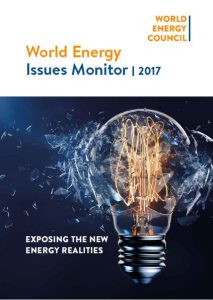
Renewables ranked high in impact within every region identified in a survey of more than 1,200 energy leaders in 95 countries. Solar has seen immense growth in installed capacity reaching 227GW by the end of 2015, while global wind power generation capacity increased at a rate of 17.2% in 2015.
In its eighth year, The World Energy Issues Monitor 2017: ‘Exposing the new energy realities’ published by the World Energy Council, provides a snapshot of the current priorities, facing global energy leaders.
Dr Christoph Frei, Secretary General of the Council said: “Our survey shows that energy leaders face and acknowledge disruptive change. The Issues Monitor illustrates that innovation issues such as digitalisation, decentralisation, innovative market design or electric storage rapidly gain traction, while a more difficult growth context and new physical and digital risks are posing ever greater threats to the energy sector. Today defining the energy agenda globally, five years ago these issues were far from being a priority.”
Other findings in 2017 include:
-
Commodity price volatility remains number one critical uncertainty
-
A shift in economic growth – slow global growth puts greater uncertainty around primary energy demand
-
Shifts in geopolitical power – due to a renewed focus on US policy, Brexit and uncertainty over EU cohesion
-
New physical and virtual risks – Cyber-attacks are posing ever greater threats to the energy sector
-
Talent acquisition and retention will become a major focus as new technologies continue to reshape the energy industry
Dr Frei commented: “The survey indeed illustrates the tensions that emerge against the context of the grand energy transition. The report does not find reasons why the current high dynamics in the energy sector would slow down. How the different regions decide to address the challenges and tensions identified in our report will define the agendas for the future.”
End
Download the 2017 World Energy Issues Monitor on: https://www.worldenergy.org/publications/2017/world-energy-issues-monitor-2017/
For further information, contact:
Lucy Chakaodza chakaodza@worldenergy.org | Tel: (+44) 20 3214 0616
Notes to Editors:
About the World Energy Issues Monitor
The World Energy Issues Monitor provides a snapshot of what keeps CEOs, Ministers and experts awake at night in over 90 countries. The monitor helps to define the world energy agenda and its evolution over time. It provides a high-level perception of what constitute issues of critical uncertainty, in contrast to those that require immediate action or act as developing signals for the future. It is an essential tool for understanding the complex and uncertain environment in which energy leaders must operate, and a tool through which one can challenge own assumptions on the key drivers within the energy landscape.
This eighth iteration of the monitor is based on insights provided by more than 1,200 energy leaders to provide over 35 national assessments across six regions.





_-80_result_688_387_s_c1_c_c.jpg)


